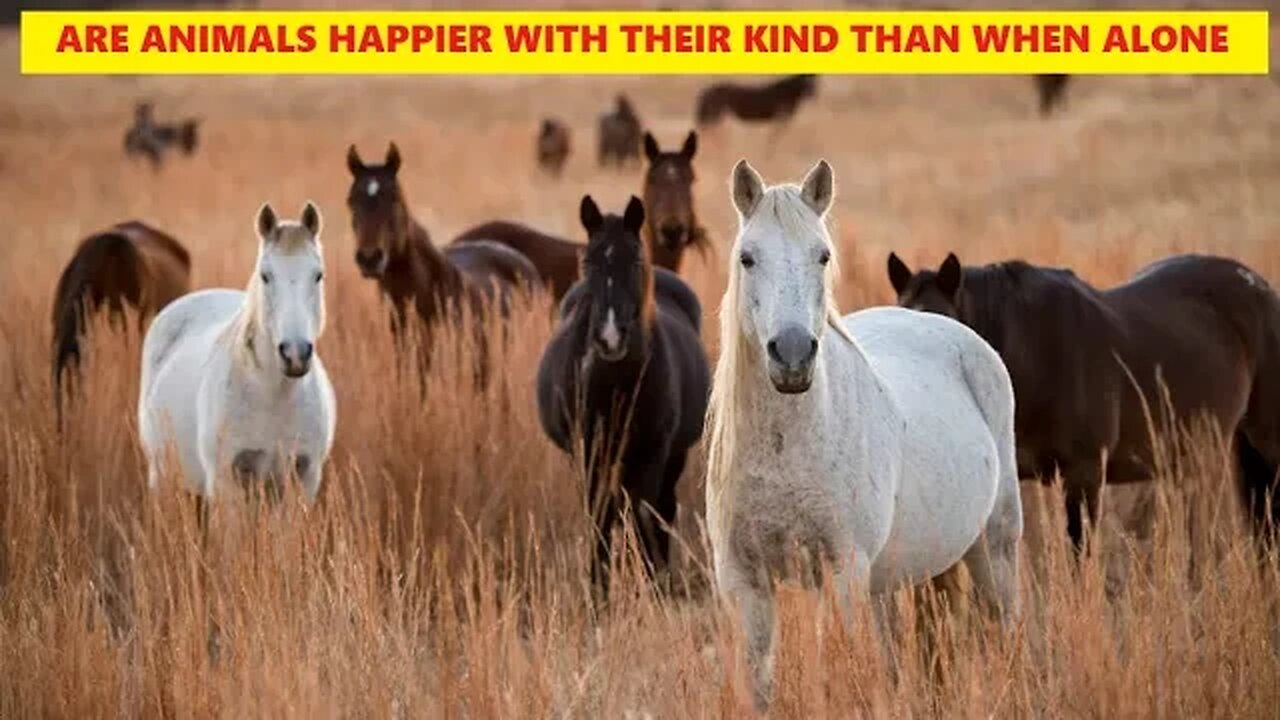Premium Only Content

Northeastern University MIT Study On Parrots Being Alone - Applies To Horses Also
I have some concerns with this Study, but agree with the intent.
Video chats like Zoom and FaceTime are great ways to stay in touch with loved ones—so great, in fact, that parrots are catching on.
A new study from researchers at Northeastern University, in collaboration with scientists from MIT and the University of Glasgow, investigated what happened when a group of domesticated birds were taught to call one another on tablets and smartphones.
The results suggest that video calls could help parrots approximate birds’ communication in the wild, improving their behavior—and, likely, their well-being—in their owners’ homes.
Rébecca Kleinberger, an assistant professor at Northeastern; Jennifer Cunha, a parrot behaviorist and Northeastern researcher; and Ilyena Hirskyj-Douglas, an assistant professor at the University of Glasgow, showed a group of parrots across a range of species and their volunteer caregivers to use tablets and smartphones how to video-call one another on Facebook Messenger.
The researchers then observed how the birds used that newfound ability over a three-month period. They wondered: If given the choice, would the birds call each other?
The answer, relayed in delighted squawks and head bobs, was a resounding yes. “Some strong social dynamics started appearing,” Kleinberger says.
According to Kleinberger, the types of vocalizations the birds used suggested they were mirroring the call and response nature they engage in in the wild—“hello, I’m here!” in parrot-speak.
The most popular parrots were also the ones who initiated the most calls, suggesting a reciprocal dynamic similar to human socialization. And while, in large part, the birds seemed to enjoy the activity itself, the human participants played a big part in that. Some parrots relished the extra attention they were getting from their humans, while others formed attachments for the humans on the other side of the screen.
The research team, which has deployed computer interaction to enrich and understand the lives of animal species ranging from dogs to orcas, honed in on parrots for a few reasons. Their intelligence is extraordinary; certain species, like cockatoos and African greys, have demonstrated cognitive capabilities equal to that of an early-elementary-aged child.
Their vision lets them make sense of movements on a screen. And as anyone who’s heard a pet bird perfectly repeat a relative’s greeting or sing the refrain of “Yellow Submarine” knows, they are perceptive and well-equipped vocalists—a trait wild parrots use to find and communicate with their flock-mates under dense rainforest canopies.
With the team’s instructions, the caregivers of the 18 parrots in the study first taught the birds to ring a bell in order to signal that they wished to make a call. (An important experimental design consideration was that the birds had free choice to make the calls or not; once they learned to use the tablet interface, they were not rewarded with treats for doing so.) Once the parrots rang their bells, caretakers presented them with a tablet home screen with pictures of possible friends to call, with pairs and trios of parrots grouped together mainly according to size and time zone.
During coordinated three-hour sessions, using their beaks to tap the screen, each bird could initiate up to two calls lasting no longer than five minutes each. Caregivers received careful instruction to end calls at the first signs of fear or aggression. Fifteen birds completed the full study; three dropped out early on.
Kleinberger cautions that the findings don’t mean parrot owners should fire up a Zoom call and assume it will go well. The participant parrots had experienced handlers who had time to introduce the technology slowly and to carefully monitor their parrots’ reactions. As the study underscored, parrots are finicky about which fellow birds they will respond to—unmediated interactions could lead to fear, even violence and property damage; larger parrots have beaks more than capable of cracking an iPad into pieces.
Still, the findings suggest that video calls can improve a pet parrot’s quality of life.
That includes the many parrots who, for a multitude of reasons, can’t physically be close to other birds—for one, disease is pervasive among certain captive species. Two sickly, elderly male macaws paired together in the study had scarcely seen another macaw in their lives, yet formed a deep bond—dancing and singing enthusiastically together through the screen and calling “Hi! Come here! Hello!” whenever one or the other moved out of the video frame.
“It really speaks to how cognitively complex these birds are and how much ability they have to express themselves,” says Hirskyj-Douglas. “It was really beautiful, those two birds, for me.”
FULL ARTICLE HERE:
https://news.northeastern.edu/2023/04/21/parrots-talking-video-calls/
-
 4:39
4:39
Think Like A Horse
1 year agoHorse Jumps Fence To Join In Bike Race - Why Did He do This
3343 -
 LIVE
LIVE
Kim Iversen
4 hours agoDOGE, Trump, Aliens and Remote Viewing: A Deep Dive into the Unknown
1,595 watching -
 1:20:08
1:20:08
Redacted News
6 hours agoPutin smells a TRAP as Ukraine agrees to Trump's U.S. ceasefire plan | Redacted w Clayton Morris
145K153 -
 51:59
51:59
Candace Show Podcast
6 hours agoMahmoud Khalil’s Detainment: Fighting Terrorism Or Speech? | Candace Ep 158
104K303 -
 7:43:31
7:43:31
Dr Disrespect
10 hours ago🔴LIVE - DR DISRESPECT - PUBG - PRO TACTICALLY WINNING
162K14 -
 1:02:40
1:02:40
In The Litter Box w/ Jewels & Catturd
1 day agoUSAID to Staff: Shred and Burn | In the Litter Box w/ Jewels & Catturd – Ep. 760 – 3/12/2025
85.4K32 -
 2:21:38
2:21:38
Darkhorse Podcast
8 hours agoMAGA, MAHA, and the Unity Movement: The 267th Evolutionary Lens with Bret Weinstein and Heather Heying
90.9K30 -
 1:58:45
1:58:45
The Quartering
9 hours agoCorrupt Democrats Caught SHREDDING Evidence, Assassination Plot On Alex Jones, Tariff Fallout & More
157K50 -
 1:27:14
1:27:14
The Officer Tatum
8 hours agoLIVE: Trump and Elon BREAK INTERNET With BRAND NEW TESLA | Officer Tatum Show EP 78
82.6K51 -
 2:10:41
2:10:41
Adam Carolla
1 day agoCatalytic Converter Theft Turns Deadly + UPDATE! Rebuilding Malibu | Adam’s Wild Malibu Trip
54.1K20